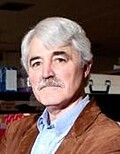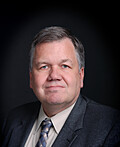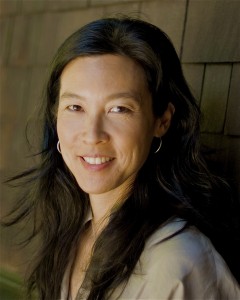Research shows that environmental exposures, including PCBs, perchlorate, and radiation, can influence thyroid function through a variety of mechanisms. On this call we explored environmental interactions with the thyroid system. Which chemical exposures affect the thyroid system? In what way? Are there links to autoimmune thyroid disease? What about multiple and cumulative exposures? What are the potential consequences? How do these environmental exposures fit into the science and treatment of autoimmune thyroid disorders such as Graves' and Hashimoto's disease?
Dr. Tom Zoeller provided an opening presentation broadly addressing chemicals and their influences on the thyroid system. Dr. Greg Brent addressed his research on environmental exposures and autoimmune thyroid disease. Dr. Cynthia Li explored thyroid disease from a functional medicine perspective. Rebecca Katz concluded the presentations with comments on the interaction between diet and the thyroid.
Featured Speakers
 Dr. R. Thomas Zoeller is Professor of Biology at the University of Massachusetts, Amherst. His early training was in molecular neuroendocrinology at the NIMH and NINDS in Bethesda, MD. His current research focuses on the role of thyroid hormone in brain development with an emphasis on the fetal brain. Dr. Zoeller’s lab is also focused on the mechanisms by which environmental endocrine disruptors can interfere with thyroid hormone action in the brain and his laboratory has published over 100 peer reviewed papers on these topics. Dr. Zoeller was a member of the U.S. EPA's EDSTAC working group on Screening and Testing in the 1990’s and received the “Scientist of the Year – 2002” from the Learning Disabilities Association. He is currently a member of EPA’s chartered Science Advisory Board and is chair of the Exposure and Human Health Committee. He has written extensively on issues of Endocrine Disruption and Public Policy.
Dr. R. Thomas Zoeller is Professor of Biology at the University of Massachusetts, Amherst. His early training was in molecular neuroendocrinology at the NIMH and NINDS in Bethesda, MD. His current research focuses on the role of thyroid hormone in brain development with an emphasis on the fetal brain. Dr. Zoeller’s lab is also focused on the mechanisms by which environmental endocrine disruptors can interfere with thyroid hormone action in the brain and his laboratory has published over 100 peer reviewed papers on these topics. Dr. Zoeller was a member of the U.S. EPA's EDSTAC working group on Screening and Testing in the 1990’s and received the “Scientist of the Year – 2002” from the Learning Disabilities Association. He is currently a member of EPA’s chartered Science Advisory Board and is chair of the Exposure and Human Health Committee. He has written extensively on issues of Endocrine Disruption and Public Policy.
 Gregory A. Brent, MD, is Professor of Medicine and Physiology, David Geffen School of Medicine at UCLA. His research includes studies on the molecular mechanisms of thyroid hormone and retinoic acid action, and the regulation of iodine transport in hormone-dependent cancers. He has conducted clinical research in hypothyroidism and thyroid disease in pregnancy. He is an elected member of the American Society for Clinical Investigation and Association of American Physicians. He has previously served the American Thyroid Association as Board Chair, Secretary/Chief Operating Officer and President. He has been recognized with the American Thyroid Association Van Meter, Ingbar, and Braverman Awards as well as the Endocrine Society Knoll Mentor Award. He is past chair of the National Institutes of Health, Molecular and Cellular Endocrinology Study Section. He has been on the editorial boards of Journal of Clinical Endocrinology and Metabolism, Molecular Endocrinology, Thyroid and Endocrinology. He was a member of the National Academy of Sciences panel for Assessment of the Health Implications of Perchlorate Ingestion. He was the second year curricular chair for endocrinology at UCLA School of Medicine and won multiple Golden Apple teaching awards as well as the UCLA Excellence in Education Award
Gregory A. Brent, MD, is Professor of Medicine and Physiology, David Geffen School of Medicine at UCLA. His research includes studies on the molecular mechanisms of thyroid hormone and retinoic acid action, and the regulation of iodine transport in hormone-dependent cancers. He has conducted clinical research in hypothyroidism and thyroid disease in pregnancy. He is an elected member of the American Society for Clinical Investigation and Association of American Physicians. He has previously served the American Thyroid Association as Board Chair, Secretary/Chief Operating Officer and President. He has been recognized with the American Thyroid Association Van Meter, Ingbar, and Braverman Awards as well as the Endocrine Society Knoll Mentor Award. He is past chair of the National Institutes of Health, Molecular and Cellular Endocrinology Study Section. He has been on the editorial boards of Journal of Clinical Endocrinology and Metabolism, Molecular Endocrinology, Thyroid and Endocrinology. He was a member of the National Academy of Sciences panel for Assessment of the Health Implications of Perchlorate Ingestion. He was the second year curricular chair for endocrinology at UCLA School of Medicine and won multiple Golden Apple teaching awards as well as the UCLA Excellence in Education Award
 Cynthia Li, MD, is a Bay Area clinician with a practice in functional medicine who treats many patients with complex chronic conditions, integrating internal medicine with lifestyle medicine. Dr. Li completed medical school, internship, and residency training at the University of Texas Southwestern Medical Center in Dallas. Since completing medical training in 2000, her practice has mostly centered around public health, with a focus on underserved communities. She worked for 3 years in the HIV/AIDS division of Kaiser Permanente in San Francisco. She volunteered with Doctors Without Borders in rural China to help them start up the first dedicated HIV/AIDS clinic there. Upon returning, she worked as a general internist and taught UCSF medical residents at San Francisco General Hospital. She also worked at St. Anthony Free Medical Clinic in the Tenderloin district of SF. Currently, she is on staff at the UC Berkeley Health Center. She is a member of the American Board of Internal Medicine and the Institute for Functional Medicine.
Cynthia Li, MD, is a Bay Area clinician with a practice in functional medicine who treats many patients with complex chronic conditions, integrating internal medicine with lifestyle medicine. Dr. Li completed medical school, internship, and residency training at the University of Texas Southwestern Medical Center in Dallas. Since completing medical training in 2000, her practice has mostly centered around public health, with a focus on underserved communities. She worked for 3 years in the HIV/AIDS division of Kaiser Permanente in San Francisco. She volunteered with Doctors Without Borders in rural China to help them start up the first dedicated HIV/AIDS clinic there. Upon returning, she worked as a general internist and taught UCSF medical residents at San Francisco General Hospital. She also worked at St. Anthony Free Medical Clinic in the Tenderloin district of SF. Currently, she is on staff at the UC Berkeley Health Center. She is a member of the American Board of Internal Medicine and the Institute for Functional Medicine.
 Rebecca Katz, MS, is a nationally recognized expert on the role of food in supporting health for the chronically ill. With an MS in Health and Nutrition Education, Rebecca is founder of the Healing Kitchens Institute and has been a visiting chef and nutrition educator at the Commonweal Cancer Help Program in Bolinas, California, for more than a decade. Rebecca is the author of the award-winning cookbook, The Cancer Fighting Kitchen: Nourishing Big Flavor Recipes for Cancer and Treatment and Beyond as well as One Bite at a Time: Nourishing Recipes for Cancer Survivors and Their Friends. Her third book, The Longevity Kitchen: Satisfying Big-Flavor Recipes Featuring the 16 Top Age-busting Power Foods was published in February 2013.
Rebecca Katz, MS, is a nationally recognized expert on the role of food in supporting health for the chronically ill. With an MS in Health and Nutrition Education, Rebecca is founder of the Healing Kitchens Institute and has been a visiting chef and nutrition educator at the Commonweal Cancer Help Program in Bolinas, California, for more than a decade. Rebecca is the author of the award-winning cookbook, The Cancer Fighting Kitchen: Nourishing Big Flavor Recipes for Cancer and Treatment and Beyond as well as One Bite at a Time: Nourishing Recipes for Cancer Survivors and Their Friends. Her third book, The Longevity Kitchen: Satisfying Big-Flavor Recipes Featuring the 16 Top Age-busting Power Foods was published in February 2013.
The call was moderated by Steve Heilig, MPH, CHE Director of Public Health & Education, and Director of Public Health & Education, San Francisco Medical Society.
